Robert M. Bowker, VMD, PhD
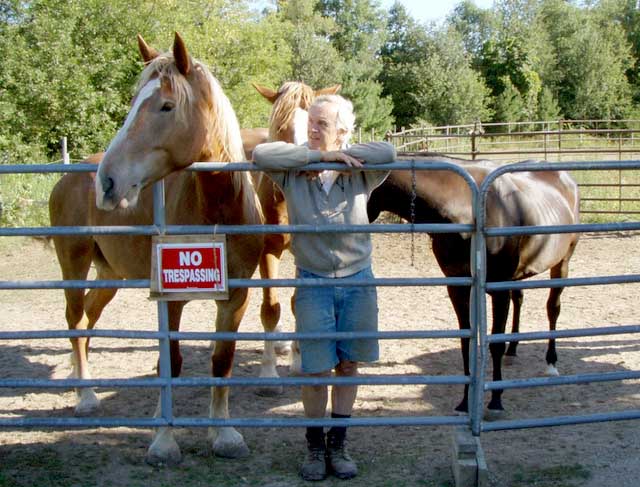
- Sunday 8:00am - 9:00am: How Does Foot Anatomy Change to Become "Normal?
- Sunday 9:00am - 10:00am: Loading of the Foot Can and Will Alter the Shape and Structures of the Digital Bones.
- Sunday 10:15am - 11:15am: Hoof Wall Growth and How Does the Hoof Adapt to "Normal" Loading?
- Sunday 11:15am - 12:15pm: Anatomy of the Palmar Foot and the Presence of a Flexible Skeleton in Healthy Feet
- Sunday 1:15pm - 2:15pm: Long Toes Seem to Dominate the Feet of the Domestic Horse. How Does this Happen?
- Sunday 2:15pm - 3:15pm: Is the Blood Supply to the Frog and Digital Cushion, as the Anatomy Books State, Scant?
is professor emeritus of Neurobiology and Anatomy at the Pathobiology and Diagnostic Investigation Department at Michigan State University.
As a research scientist and educator, Dr. Bowker has made significant contribution to understanding the dynamic and functional architecture of the equine foot, and continues to explore areas not previously considered to help maintain equine foot health.
He is an internationally recognized author, lecturer, and teacher with an extensive publication list of more than 150 publications. In 2008, Dr. Bowker established the Michigan Equine Podiatry and Laminitis Research Center, where he continues to pursue collaborative research programs with experts from around the globe.
Johan Bröjer, DVM, MSc, PhD, Dipl. ACVIM (LAIM), Dipl. ECEIM
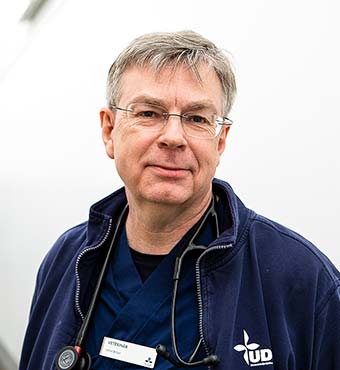
- Saturday 9:00am - 10:00am: Mechanisms Leading to Hypertriglyceridemia in SGLT2-treated Horses (ECIR-Funded Research).
is the inaugural awardee of the 2024 ECIR Group Inc. research grant. He is a professor of Equine Internal Medicine at the Swedish University of Agricultural Sciences (SLU). Dr. Bröjer holds an MSc from the University of Guelph, Canada and a PhD from the SLU, both in the area of equine exercise physiology. Dr. Bröjer is a research leader for the Swedish equine endocrinology team at the SLU. The research has focused on pathophysiology, diagnosis, and treatment of equine insulin dysregulation. Currently, he is focusing on pharmacological treatment of insulin dysregulated horses with SGLT2 inhibitors. These research projects are in collaboration with Uppsala Diabetes Centre, Norwegian University of Life Sciences (NMBU), and the District Veterinarians in Sweden.
Priska Darani, PhD, PAS
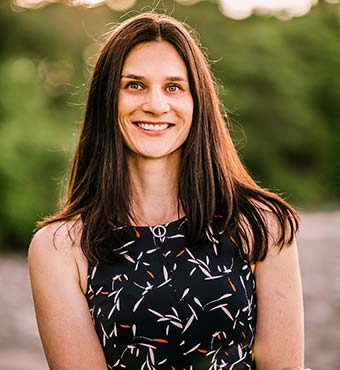
- Saturday 1:15pm - 2:15pm: Effects of vitamin/mineral supplementation with or without jiaogulan on hoof growth, metabolic health, and nutrient status in mature horses.
has a lifelong passion for understanding how diet regulates metabolism and contributes to health in both humans and animals. Priska grew up on a dairy farm in Eastern Ontario before attending the University of Guelph in 2005 to complete a B.Sc. in Animal Biology with a focus on nutrition. While at Guelph, she worked at the Arkell Poultry and Equine Research Station where she assisted with daily care of the horses. In 2012, she received an M.Sc. for OMAFRA-funded research on how altering the amino acid balance of lactating cow rations can affect milk production and composition. In 2016, she completed her Ph.D. degree focusing on nutritional regulation of insulin sensitivity and using mathematical models to predict metabolic responses. Dr. Darani is a certified Professional Animal Scientist (PAS) through the American Registry of Professional Animal Scientists (ARPAS), signifying her commitment to science-driven, ethical practices in animal nutrition, care, and management, as well as her adherence to top professional standards in the field.
Suzanne Gottschang, PhD, MPH
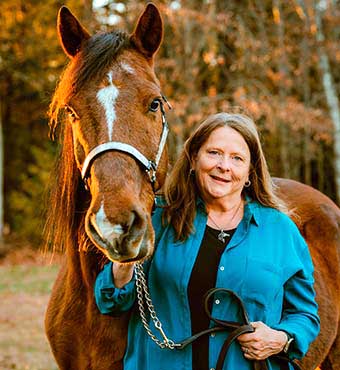
- Friday 11:30am - 12:30pm: Every Horse is Different: How Owners Navigate and Manage Equine Metabolic Disease and PPID.
is a medical anthropologist whose work contextualizes how individuals navigate governance and knowledge systems at the intersections of health, science, and medicine. Her current research focuses on the increasing prevalence of chronic diseases in horses and how horses, their caregivers, and veterinarians deal with the uncertainties of treatment and care by drawing on experiential and anecdotal knowledge and practices as well as those of evidence-based veterinary medicine.
Kathleen Gustafson, PhD
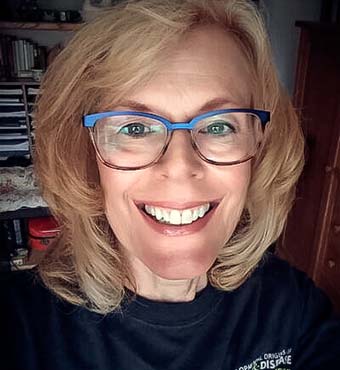
- Saturday 10:15am - 11:15am: Nutrition Considerations for Equine Hyperinsulinemia.
- Saturday 11:15am - 12:15am: Factors Affecting Forage Carbohydrates.
is Professor Emerita of the University of Kansas Medical Center with a background in neuroscience and nutrition. She became involved with the ECIR Group when her gelding, "Joe" developed EMS and laminitis in 2005. Thanks to the rapid response and sound management protocols developed by the ECIR Group, Joe made a full recovery and returned to work, living a long life free from EMS/PPID and laminitis. Impressed by the altruism of the ECIR Group with its all-volunteer and science-based mission, Kathleen serves the group as Vice President and Research Advisor.
She has over 70 peer-reviewed publications, national and international patents, and served as both principle and co-investigator on clinical trials sponsored by the National Institutes of Health. She has co-authored papers with Eleanor Kellon, VMD, on topics related to metabolic disorders in horses. As the owner of Great Plains Forage Balance, she maintains a forage database and consults with owners, farriers, and veterinarians so they may formulate a comprehensive and practical feeding plan based on nutrient requirements.
Jo Ireland BVMS PhD CertAVP(EM) FHEA FRCVS's
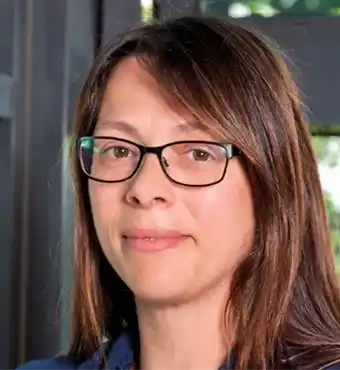
- Saturday 8:00am - 9:00am: Factors Affecting ACTH Concentration and Implications for Endocrine Diagnostic Testing.
role at the University of Liverpool is split between veterinary education and research. She is coordinator of four veterinary postgraduate modules for the RCVS Certificate of Advanced Veterinary Practice, as well as Program Director for the Postgraduate Diploma, and Master's in Veterinary Professional Studies programs. Jo's main research interests are equine epidemiology and internal medicine, particularly geriatric medicine, endocrine disorders, endocrinopathic laminitis and lower respiratory tract disease. Jo is a member of the Equine Veterinary Journal Study Design and Data Analysis Board and Associate Editor for Veterinary Evidence.
Eleanor M. Kellon, VMD
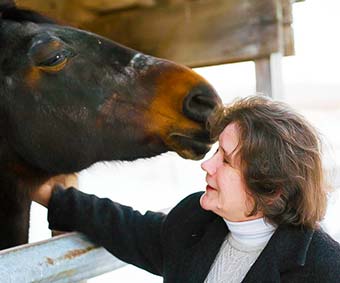
- Friday 8:15am - 9:15am: Early Signs of PPID.
- Friday 9:15am - 10:15am: Pergolide Dosage and Other ECIR Poll Results.
- Saturday 2:15pm- 3:15pm: GLP-1 — Friend or Foe?
- Saturday 3:30pm - 4:30pm: Hypertriglyceridemia with SGLT2i — Biochemistry and Management.
has devoted decades to the study of Pituitary Pars Intermedia Dysfunction (PPID)/Cushing's and Insulin Resistance (IR) in horses. As the owner of Equine Nutritional Solutions, she is well known for her work with nutraceuticals for horses and is an authority on equine nutrition and conditions affecting performance horses. A best-selling author, Dr. Kellon is well known for her field trials breaking new ground.
Dr. Kellon's professional meetings and publications have included the use of the herb Gynostemma pentaphyllum and the blue-green algae Spirulina platensis in the Horse and Iron Status in Hyperinsulinemic/Insulin Resistant Horses (European Equine Health and Nutrition Congress 2006). Recent publications with Kathleen Gustafson, PhD, describe the relationship between equine hyperinsulinemia and hyperferritinemia, the use of SGLT2i drugs, and dietary considerations in the equine. Her 2024 paper Insulin resistance versus dysregulation—a distinction without a difference was published in Equine Veterinary Education, the official publication of the AAEP and BEVA. Dr. Kellon is a contributing author to several texts on laminitis and dietary therapy of insulin resistance.
Since 2008, Dr. Kellon has seen over 10,000 students through her online nutrition and health courses. She is Veterinary Nutritionist for Mad Barn, chief volunteer for the 8,000+ international member ECIR outreach group, and Veterinary Advisor to the ECIR Group nonprofit.
Elaine Norton, DVM, MS, PhD, DACVIM-LA
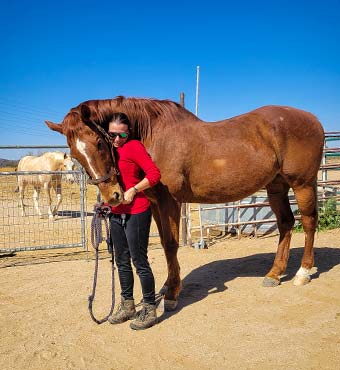
- Friday 3:45pm - 4:45pm: Risk of Equine Metabolic Syndrome in Arabian Horses and Their Subgroups.
is an assistant professor in the Animal and Comparative Biomedical Sciences Department and the College of Veterinary Medicine at the University of Arizona. Her research focuses on improving animal health by reducing the risk of laminitis through precision medicine. Currently, she investigates the interactions between genomic risk factors and environmental influences in equine metabolic syndrome (EMS) to enhance the understanding of its pathophysiology and improve patient management. Dr. Norton's passion for horses began in her childhood, riding dressage. Tragically, she lost her first horse to laminitis, inspiring her lifelong dedication to finding ways to prevent and treat this devastating disease. After not being able to ride for a few decades, Dr. Norton is back in the saddle and finally checking off a bucket list item by learning how to jump.
David Rendle, BVSc MVM CertEM, DipECEIM FRCVS
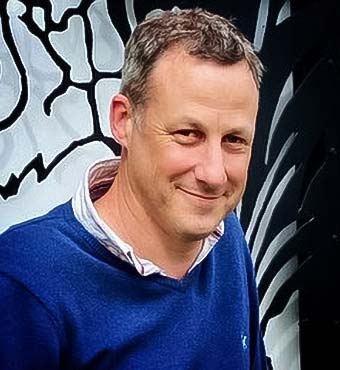
- Friday 10:30am - 11:30am: Obesity, Hyperinsulinemia, and the Curse of Laminitis.
RCVS and European Specialist in Equine Internal Medicine, served a few years in farm and equine practice, and then spent over 20 years specialising in equine medicine, predominantly in private referral practice in the UK. He is a Past President of the British Equine Veterinary Association, former chair of their health and medicines committee and sits on a number of equine industry advisory groups. David has an active research interest in equine endocrinology and gastroenterology and speaks regularly internationally. He now works as an internal medicine and therapeutics consultant with most of his time being spent on R and D projects related to equine medicine.
Harold C. Schott, DVM, PhD, DACVIM
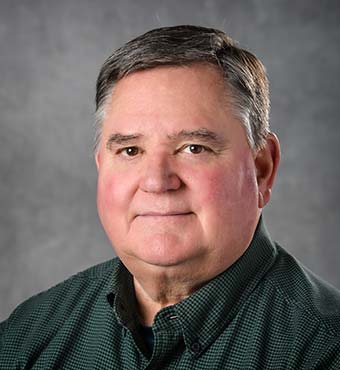
- Friday 1:30pm - 2:30pm: Is PPID Parkinson's Disease of Equids?
earned a bachelor's degree from Cornell in 1980 and a DVM from The Ohio State University in 1984. He worked in a private equine practice in Santa Barbara, Calif., from 1984 to 1987 and followed that with a residency and PhD program at Washington State University from 1987 to 1991. He was on the WSU faculty from 1991 to 1995 as an instructor and then an assistant professor of equine internal medicine. In 1995, he came to Michigan State University as an assistant professor and progressed to associate and then full professor. He is a Diplomate of the American College of Veterinary Internal Medicine.
Kathleen Sullivan, PhD, MS
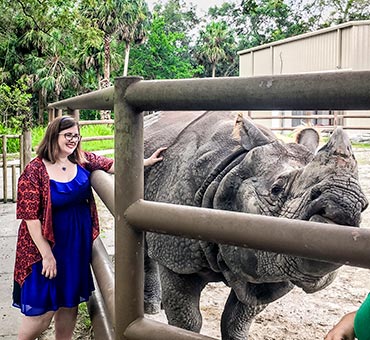
- Friday 2:30pm - 3:30pm: Mitigating Iron Overload Disorder in the Black Rhino: Comparative Solutions to a Cross-Species Issue.
received her BS in animal science at Cornell University (working with Dr. Skip Hintz, who shared his passion for equids), and MS at North Carolina State University in nutrition and animal science. Working with human and equine nutritionists, she completed her PhD in nutritional biochemistry at University of Florida focused on iron overload disorder (IOD) in black rhinoceros. She serves as nutrition advisor for rhinos for the Rhino Research Council of the Rhino TAG/AZA, nutrition advisor for the giraffe SSP and on the Nutrition Advisory Group to the AZA steering committee. She is currently president of the Comparative Nutrition Society, an international group of scientists dedicated to the pursuit of knowledge, interdisciplinary approaches, and professional development in nutrition across species. Kathleen has spent the last 18 years at Disney's Animal Kingdom working across hundreds of species. Her passion for practical comparative nutrition research has led to executing, analyzing, presenting, and publishing over 100 studies.
Tania Sundra, BSc (Hons) BVMS MANZCVS (Equine Medicine)
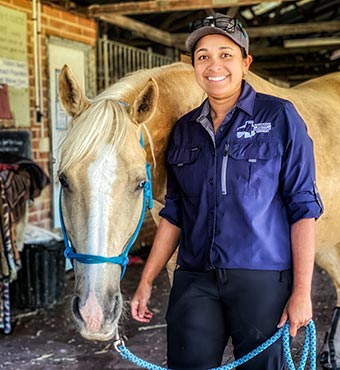
- Friday 4:30pm - 5:30pm: Veterinary Experiences with SGLT2 Inhibitors.
graduated from Murdoch University in 2009 and completed an equine internship at a busy performance horse hospital in the USA. Upon returning home she spent a few years working in racetrack and repro clinics in Western Australia. In 2015, Tania founded Avon Ridge Equine Veterinary Services – an ambulatory equine practice servicing Perth and surrounding regions. In 2019, she successfully completed examinations to become a member of the Australian & New Zealand College of Veterinary Scientists, Equine Medicine chapter. Tania has a keen interest in all things related to equine medicine, and is actively involved in clinical research.
